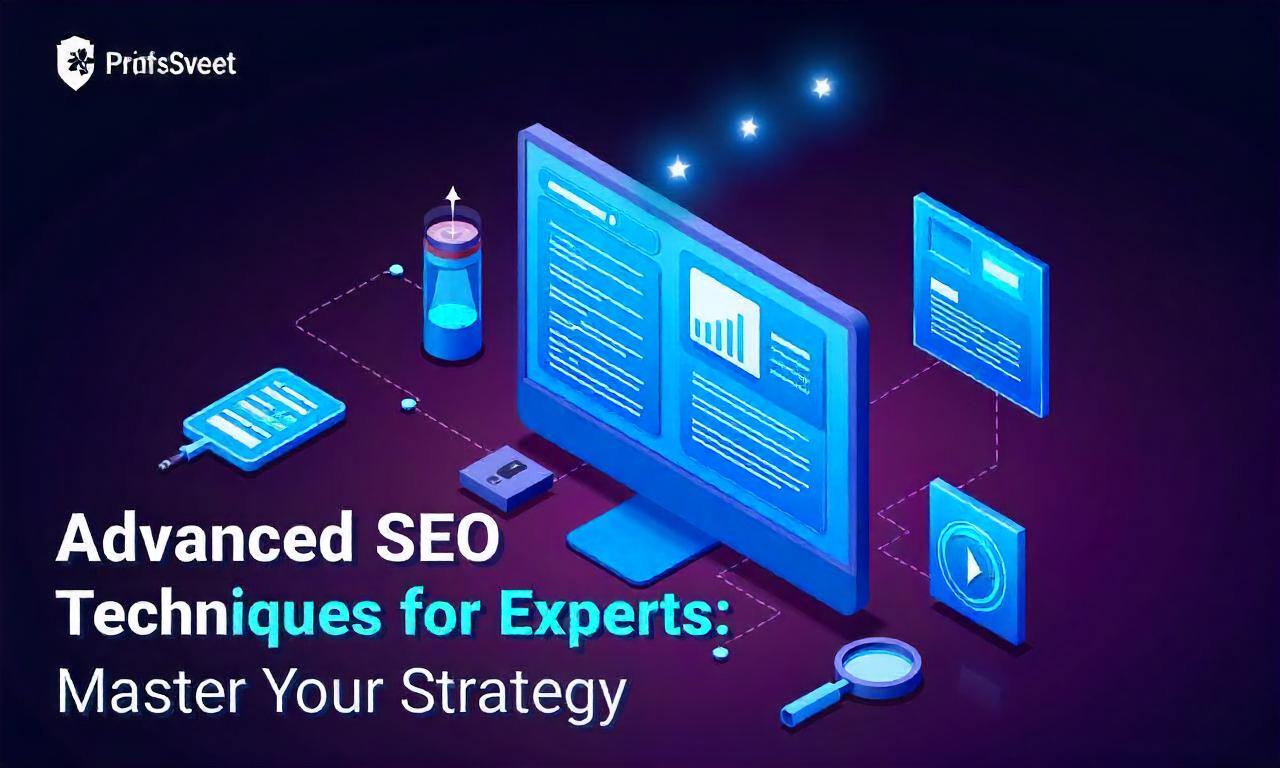Advanced SEO Techniques for Experts: Master Your Strategy

In the ever-evolving world of digital marketing, SEO remains a cornerstone for driving organic traffic and improving online visibility. While beginner SEO strategies can get you started, advanced SEO techniques for experts are what separate the good from the great. For seasoned professionals, mastering these techniques is essential to staying ahead of the competition, maximizing search engine rankings, and creating a sustainable online presence. This article dives deep into the advanced SEO techniques for experts, covering technical, content, on-page, and off-page strategies that can elevate your SEO game to new heights.
Technical SEO: The Foundation of Advanced Optimization
Technical SEO focuses on improving the backend of your website to make it more accessible and efficient for search engines. While basic SEO might involve checking for broken links or optimizing images, advanced SEO techniques for experts require a deeper understanding of how search engines crawl and index content.
Site Speed Optimization: A Critical Factor
Site speed is a key ranking factor that search engines like Google prioritize. A fast-loading website not only improves user experience but also enhances search engine performance. Experts often use tools like Google PageSpeed Insights or GTmetrix to analyze load times and identify bottlenecks. To optimize site speed, consider implementing lazy loading for images, compressing files using Gzip or Brotli, and leveraging browser caching. Additionally, CDN (Content Delivery Network) services can help distribute content globally, ensuring quicker delivery to users regardless of their location.
Structured data is a powerful tool that allows you to provide search engines with specific information about your content. By using schema markup, you can create rich snippets that appear in search results, giving users a clearer idea of what your page offers. For example, product pages can include structured data for price, ratings, and availability, while event pages might highlight date, time, and location. Implementing structured data requires advanced knowledge of JSON-LD and choosing the right schema for your content type. This technique is especially useful for experts targeting niche markets or competing for high-traffic keywords.
Mobile-First Indexing: Adapting to the New Standard
Google’s mobile-first indexing means that the mobile version of your site is the primary version crawled and indexed. Advanced SEO techniques for experts must ensure that the mobile experience is as robust as the desktop one. This involves optimizing responsive design, reducing page load times on mobile devices, and ensuring touch-friendly navigation. Experts also pay close attention to mobile-specific metrics like scroll depth and CLS (Cumulative Layout Shift) to prevent user frustration. Tools like Lighthouse can help audit and improve mobile performance, making it a vital part of any advanced SEO strategy.
Canonical Tags: Resolving Duplicate Content Issues
Duplicate content can confuse search engines and dilute your rankings. Canonical tags are a solution that tells search engines which version of a page is the primary one to index. Experts use these tags strategically to consolidate authority for specific content, especially when dealing with product variations, blog posts with similar titles, or content syndicated across platforms. Proper implementation of canonical tags ensures that backlinks and traffic are directed to the most relevant page, improving overall site authority.
Content Optimization: Crafting Irresistible Value
Content is the heart of SEO, and advanced SEO techniques for experts require a more nuanced approach to content creation. While basic SEO might involve keyword placement, experts focus on content quality, semantic SEO, and user intent alignment to drive deeper engagement and higher rankings.
Semantic SEO: Beyond Keywords
Semantic SEO involves understanding the context and intent behind user searches, not just the keywords themselves. Experts use tools like AnswerThePublic or Google's Keyword Planner to identify long-tail keywords and related topics that align with user needs. For instance, instead of targeting a single keyword like “best running shoes,” a semantic approach might include content around “how to choose the best running shoes for different terrains” or “running shoes for beginners.” This technique helps search engines recognize the relevance of your content and improves organic visibility for a broader range of queries.
Content Quality: The Ultimate Ranking Factor
High-quality content is the foundation of any successful SEO strategy. Experts focus on creating evergreen content that remains relevant over time and content that addresses user pain points directly. This includes thorough research, in-depth analysis, and a natural flow that keeps readers engaged. Content quality also involves originality—avoiding duplicate content and ensuring your material provides unique value. For example, case studies, how-to guides, and data-driven insights are preferred by search engines and users alike. By prioritizing content that educates, entertains, or solves problems, experts can build trust and authority, which are critical for long-term success.
Long-Tail Keywords: Targeting Specific Queries
Long-tail keywords are longer, more specific phrases that often have lower competition but higher conversion rates. Advanced SEO techniques for experts emphasize the importance of identifying and targeting these keywords through thorough research. For instance, instead of targeting a broad term like “SEO tips,” an expert might focus on “advanced SEO techniques for experts to improve site speed.” This approach allows for more targeted traffic and better alignment with user intent. Tools like SEMrush or Ahrefs can help uncover low-competition long-tail keywords that are relevant to your niche.
Internal Linking: Strengthening Site Architecture
Internal linking is a strategy that helps search engines understand the structure of your website while also guiding users to related content. Experts use advanced internal linking techniques such as linking to high-authority pages, creating a logical hierarchy, and using descriptive anchor text. For example, a blog post about “advanced SEO techniques for experts” might link to a guide on “structured data implementation” or “mobile-first indexing.” This not only improves user navigation but also distributes page authority across your site, boosting search engine rankings for multiple pages.
On-Page SEO: Fine-Tuning Every Detail

On-page SEO involves optimizing the content and HTML elements of your web pages to improve their visibility in search results. While basic on-page SEO might focus on title tags and meta descriptions, advanced SEO techniques for experts require a more strategic and analytical approach.
Title Tags: Maximizing Click-Through Rates
Title tags are the first thing users see in search results, making them critical for click-through rates (CTR). Experts craft unique, descriptive title tags that include primary keywords and convey the page’s value. For example, instead of using a generic title like “SEO Guide,” an expert might write “Master Advanced SEO Techniques for Experts: Boost Your Rankings in 2024.” This technique ensures that search engines and users are both aligned with your content’s purpose, increasing the likelihood of organic traffic.
Meta Descriptions: Enhancing User Experience
Meta descriptions are the snippets that appear beneath title tags in search results. While they don’t directly impact rankings, they play a significant role in user clicks. Advanced SEO techniques for experts focus on writing compelling meta descriptions that include action verbs and relevant keywords. For instance, a meta description for a blog post on “advanced SEO techniques for experts” might read: “Discover cutting-edge SEO strategies that help experts rank higher and drive more organic traffic. Learn how to master technical SEO, content optimization, and on-page tactics for sustainable growth.”
Header Tags: Organizing Content for Search Engines
Header tags (H1, H2, H3, etc.) help search engines understand the structure of your content. Experts use header tags strategically to highlight key topics, subtopics, and section breaks. For example, in a post about “advanced SEO techniques for experts,” the H1 would be the main title, while H2s could cover sections like “Technical SEO” or “Content Optimization.” This not only improves readability but also signals importance to search engines, potentially boosting keyword rankings.
Image Optimization: Enhancing Visual SEO
Images are a vital part of content, but they require optimization to contribute to SEO success. Experts ensure that image file names and alt text include relevant keywords, while also compressing images to reduce load times. Additionally, using descriptive file names like “advanced-seo-techniques-for-experts-1.jpg” instead of “img1.jpg” helps search engines index the image correctly. Lazy loading and image sitemaps are also advanced techniques that can improve user experience and crawl efficiency.
Off-Page SEO: Expanding Your Authority Beyond the Site
Off-page SEO refers to strategies that improve your website’s visibility and authority outside of its own content. While basic off-page SEO involves backlinks from other websites, advanced SEO techniques for experts require a holistic approach that includes social media engagement, local SEO, and content marketing.
Backlink Building: Quality Over Quantity
Backlinks are one of the most important factors in search engine rankings, and advanced SEO techniques for experts emphasize building high-quality backlinks from authoritative sources. Experts focus on guest posting, collaborations with industry leaders, and creating shareable content that naturally attracts links. For example, a case study or data-driven analysis might be shared on popular SEO forums or industry blogs, earning backlinks from relevant domains. Additionally, link equity is maximized by ensuring that backlinks are contextually relevant and directly related to your content’s topic.
Social Media Engagement: Driving Traffic and Authority
Social media is a powerful tool for off-page SEO, as it helps drive traffic to your website and build brand authority. Experts use social media platforms like LinkedIn, Twitter, and Instagram to share content, engage with the audience, and build relationships with influencers. For instance, sharing an infographic about “advanced SEO techniques for experts” on LinkedIn might attract industry professionals who then link back to your site. Social signals like shares, likes, and comments also indirectly influence rankings, as they indicate content quality and popularity.
Local SEO: Targeting Hyper-Local Audiences
For experts targeting local markets, local SEO is a critical component of their strategy. This involves optimizing Google My Business profiles, using location-based keywords, and building local citations. For example, a local SEO expert might target keywords like “advanced SEO techniques for experts in New York” to attract users in that specific region. Advanced SEO techniques for experts also include optimizing for voice search, which is becoming increasingly important as more users rely on smart speakers for local queries.
Content Marketing: Creating Value for Others
Content marketing is a proactive approach to off-page SEO, where experts create content that benefits others and encourages sharing. This could involve blogs, videos, podcasts, or infographics that provide value to the audience. For instance, a video explaining advanced SEO techniques might be shared on YouTube and promoted on social media, attracting backlinks from related websites. Advanced SEO techniques for experts also include leveraging content hubs—centralized areas on your site that aggregate related content and serve as a resource for users.
Conclusion
Mastering advanced SEO techniques for experts requires a combination of technical precision, content excellence, on-page strategy, and off-page authority. By focusing on site speed optimization, semantic SEO, mobile-first indexing, and canonical tags, experts can ensure their websites are search engine-friendly and user-centric. Additionally, fine-tuning title tags, meta descriptions, header tags, and image optimization helps improve on-page rankings and enhance user experience. Off-page strategies like backlink building, social media engagement, local SEO, and content marketing further expand your reach and establish authority in your niche.
Whether you’re a SEO expert looking to refine your strategy or a digital marketer aiming to boost your rankings, these advanced SEO techniques for experts provide a roadmap to sustainable success in the ever-competitive online landscape. By continuously analyzing performance, adapting to trends, and implementing data-driven strategies, you can stay ahead of the curve and dominate search results. Ultimately, the key to advanced SEO is not just to optimize for algorithms, but to create value for users—a balance that expert SEO professionals excel at.
